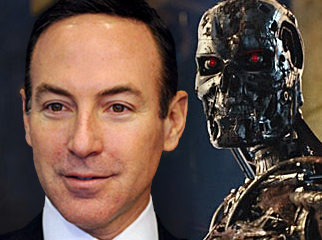 Ader Investment Management boss (and former IGT nemesis) Jason Ader says online gambling represents an existential threat to its brick-and-mortar counterparts. On Monday, Ader made an appearance on the CNBC network’s Talking Numbers segment, during which he described online gambling as “probably the single worst threat to land-based casinos that I’ve seen in 20-plus years.”
Ader Investment Management boss (and former IGT nemesis) Jason Ader says online gambling represents an existential threat to its brick-and-mortar counterparts. On Monday, Ader made an appearance on the CNBC network’s Talking Numbers segment, during which he described online gambling as “probably the single worst threat to land-based casinos that I’ve seen in 20-plus years.”
Ader (pictured right, having just been targeted for destruction by an online gambling operator) cautioned that it wasn’t yet clear how regulated US online gambling would present itself, whether it would be limited to poker-only or full-on casino gaming. But Ader warned that “if you’re able to bring wagering – sports wagering, poker, baccarat, slots – real money to people’s homes, it’s going to have a devastating consequence on riverboat gaming, Native American gaming, [and] Las Vegas.” (Translation: to hell with Atlantic City.)
Asked why brick-and-mortar casino companies shouldn’t welcome the option to extend their businesses online, Ader suggested that “who at the end of the day owns online customers, I’d argue, is much more connected to Google’s business, Facebook’s business, Amazon’s business … The online players really have the competitive advantage in getting online customers. They, to me, seem like they may well be the hidden beneficiaries to the extent we get a proliferation of online gaming and again, it comes at the expense of the land-based operators.”
It’s worth noting that Ader is a board member of Las Vegas Sands, whose boss Sheldon Adelson’s antipathy toward online gambling is the stuff of comedic legend. The online/land-based zero-sum paradigm espoused by the LVS clique has long been rubbished by the man whose name this site bears, and similar sentiments were recently espoused by Peter Brooks, president and COO of Genting UK, which, until Rank Group acquired 19 Gala Casinos’ properties, was the UK’s biggest land-based casino operator.
Speaking at the recent World Gaming Executive Summit, Brooks said “online does not cannibalize land-based, for us. The experiences on offer are very different. One – online – is a solo experience and the other is a social experience.” Brooks said land-based customers weren’t “drawn to online gambling to the detriment of the land-based industry.” As someone speaking from a market in which the full range of online gambling products has been peacefully co-existing with their brick-and-mortar forebears for years, Brooks presumably has some idea of what he’s talking about.
